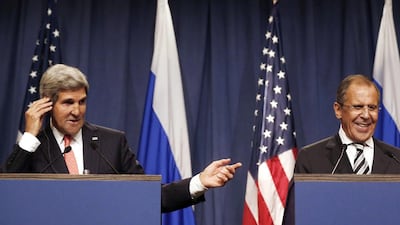NEW YORK // While the US-Russia deal to strip Syria of chemical weapons received praise for how quickly it was agreed upon, analysts said the agreement lacked a strategy to end the conflict.
Many had been convinced the talks in Geneva were a prelude to a never-ending process of smoke and mirrors designed to keep Washington at bay while the momentum for military intervention faded away.
Though it is uncertain whether Syria has signed on or will complicate the implementation of the initiative, it appears that the three countries involved will be satisfied for now.
But the central issue of ending Syria’s civil war has been obscured by the narrow focus on chemical weapons.
Analysts said the plan does nothing to address the continuing lack of a coherent strategy to achieve the end of a conflict that has killed more than 100,000 people and displaced nearly seven million.
“We’re still left with the question of what our Syria policy looks like,” said Michael Hanna, a Middle East expert at The Century Foundation think tank in New York. “I don’t think that approach is going to be tenable going forward: the stakes are increasing, the spillover effects are multiplying and laissez faire is not going to work here.”
There were some signs that the Obama administration, which had refused to become involved militarily in the two-and-a-half-year conflict, is realising that inaction is becoming costlier than limited involvement.
On Thursday, the US secretary of state, John Kerry, the Russian foreign minister, Sergey Lavrov, and the United Nations peace envoy, Lakhdar Brahimi, pledged to meet during the UN general assembly this month to set a date for renewed peace talks, known as the Geneva II process.
Also last week, there were reports that long-promised US light weapons were finally flowing to rebels and that the volume may increase.
But the White House remains wary of an opposition whose most potent fighters are Islamist militants, Mr Kerry said, and it has deep concerns about who would control a post-Assad Syria.
“I have seen no strong movement in the administration to do a lot to help the rebels, and I can’t say I see clear strategic thinking,” said Jeffrey White, a former Defence Intelligence Agency official. “There’s no reason to believe we will suddenly move from playing chequers to playing chess here.”
Strengthening the moderate rebels Washington says it considers to be the legitimate representatives of the Syrian people is only one facet of a plan to achieve a negotiated peace settlement.
Just as important, analysts say, is the need for political strategy by the opposition to convince the majority of Syrians sitting on the fence that they will have a say in the process if Mr Al Assad is forced out.
“And unless that is done now, unless [the opposition] says here are some practical proposals for why you should risk breaking with the regime, any diplomacy that arises from the chemical weapons issue that could start a virtuous cycle of wider talks won’t happen,” said Yezid Sayigh, a senior fellow at the Carnegie Middle East Center in Beirut.
However, the Syrian National Coalition has been unable to provide a cohesive front despite being recognised by the West as the official Syrian opposition.
Factional differences have hindered its plans to set up an interim government to administer rebel-held areas of the country.
It yesterday elected Ahmad Tumeh, a moderate Islamist, as provisional prime minister to replace Ghassan Hitto, who resigned in July after just four months in the post having failed to form an opposition cabinet from among the fractious group.
Mr Sayigh said that to build on the momentum and relaunch the Geneva II process, Russia and the US must have a concrete idea of what a feasible middle-ground compromise looks like, and then push both sides to begin taking steps, though he is doubtful the Assad government can ever be persuaded to negotiate.
“We have no evidence yet that the US is putting pressure on allies in the Middle East or the [Syrian] opposition to do anything on the diplomatic or political front,” he said. “How can the US put pressure on people without having a game plan beyond the immediate?”
Meanwhile, the Assad regime could emerge from the chemical weapons deal in a stronger position and reaffirm itself as the legitimate government to the international community.
“They will start saying: ‘We’ve given concessions and shown we’re a responsible state, so start treating us as such, not as a pariah’,” said Mr Sayigh.
Without a clear strategic vision, the US will not be able to easily counter this drift towards legitimacy, he added.
With the possible resumption of negotiations with Iran over its nuclear programme, which analysts said was Washington’s real priority in the Middle East, and a looming budget battle in Congress, many are sceptical that Mr Obama sees a return to the pre-chemical weapons status quo as a major problem.
“It’s going to be hard to maintain American interest,” said Ian Bremmer, the president of the Eurasia Group, a political risk consultancy based in New York.
“The real shame of all this is that Assad is more entrenched and the rebels are truly undermined.”
tkhan@thenational.ae

